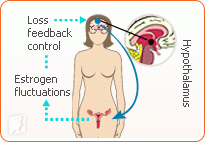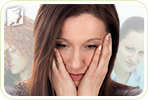Mood swings can trigger a wide range of emotions, from extreme happiness to deep depression. They are also one of the first symptoms women experience as they enter the perimenopause stage.
Since hormones are directly tied to the way we feel, it's not surprising that most women experience more mood swings during menopause, a time when their hormone levels are fluctuating drastically.
Keep reading to find more about mood swings and menopause.
How Does Menopause Affect Mood Swings?

Menopause and mood swings go hand in hand. Levels of the reproductive hormones estrogen and progesterone affect mental levels of serotonin and endorphines, neurotransmitters that regulate emotions. As a result, women experience sudden changes in their emotional state. If you are experiencing mood swings, it is likely that you may also experience other symptoms of menopause like fatigue, hot flashes, stress, and insomnia.
What Are Other Causes of Mood Swings?
Here is a short list of the other common causes of mood swings:
Eating disorders. If you are bulimic, anorexic, or suffer from another type of eating disorder you should seek help. An eating disorder will affect mood, menstrual cycles, overall health, and can cause serious health problems.
Chemical imbalance. Chemical imbalances in the brain are common causes for mood swings. These disparities in normal hormone or chemical levels may be reduced by incorporating regular exercise into your daily routine. Exercise is an excellent way to reduce stress and improve mood stability.
Fatigue. Being overly tired can greatly affect your mood. If you are experiencing fatigue, it may be a cause for sudden changes in your emotional state. Try to do relaxing activities in the evening and make sure you are getting enough sleep each night to avoid fatigue symptoms during the day.
-

Stress. Stress can lead to both depression and mood swings. Women in the their 40s and 50s often experience high stress levels due to work, family issues, and financial obligations, among other reasons. A highly stressful life can lead to imbalanced hormones, making emotions more volatile and difficult to control.
Modern living. Fast food, traffic, chaos, lack of patience, a highly stressful work environment, and aspects of modern life can increase the occurrence of mood swings.
Treatments for Mood Swings
Women experience nearly twice as many mood swings as men. This is most likely due to the hormonal imbalance that affects many menopausal women. Since menopause is thought to be the main contributor to mood swings, treatments that stabilize hormones can be an effective way to reduce these frustrating changes of emotion.
Exercising, eating a healthy diet, and reducing stress are some of the most important things you can do to reduce menopause symptoms and improve your mood. Also, there are some alternative medicines like herbal teas and natural supplements that have been known to help alleviate mood swings and other menopausal symptoms.
Sources
- Amin, Zenab, Turhan Canli, and C. Neill Epperson. "Effects of Estrogen-Serotonin Interactions on Mood and Cognition". Behav Cogn Neurosci Rev 2005; 4; 43.
- Dr. Love, Susan, and Karen Lindsey. Dr. Susan Love's Menopause and Hormone Book. New York: Three Rivers Press, 2003.
- Molecular Psychiatry. (n.d)."Estrogen Promotes Gender Difference in Brain's Response to Stress". Retrieved from www.psycheducation.org.
- The Health Center.(n.d)."Adult Mood Swings". Retrieved from www.thehealthcenter.info.



